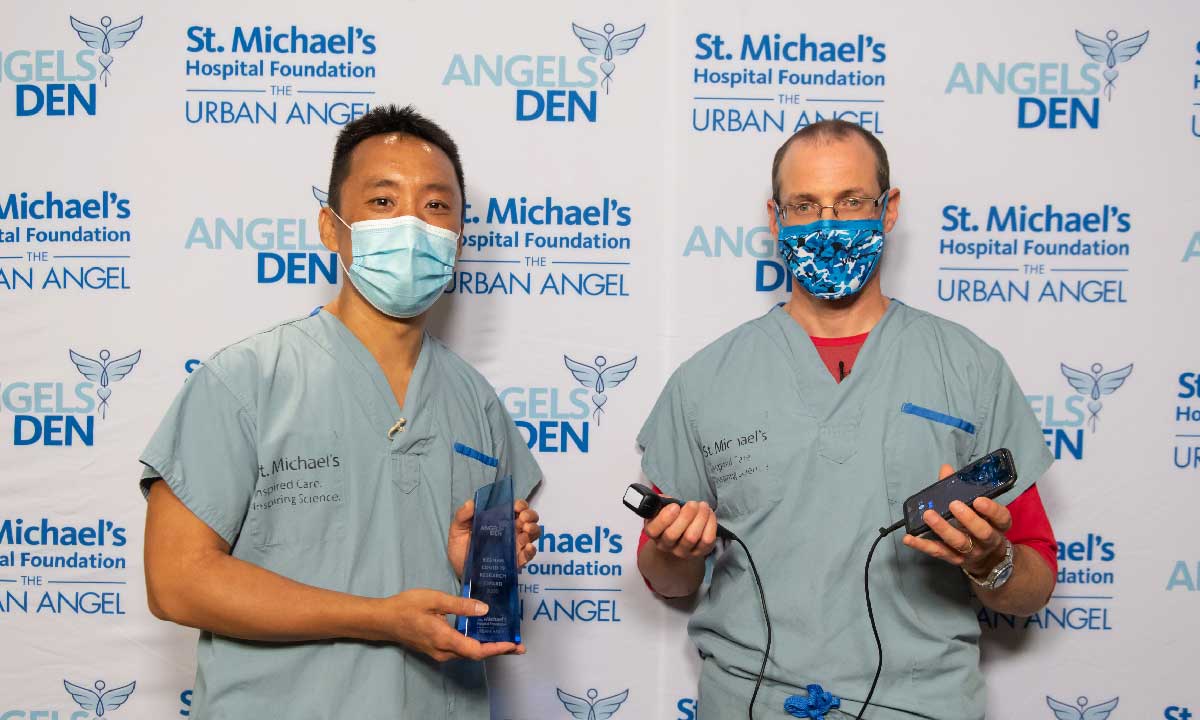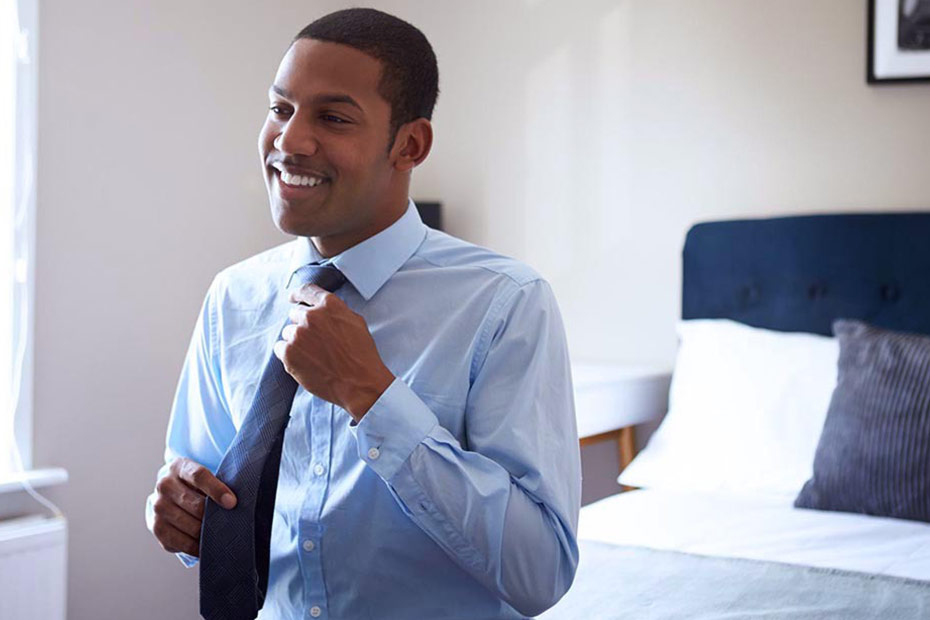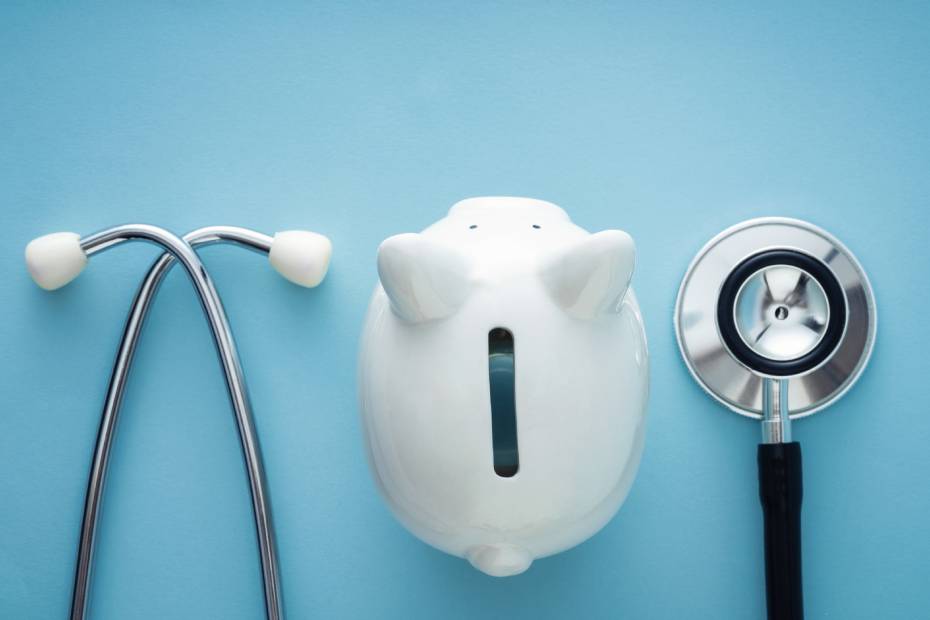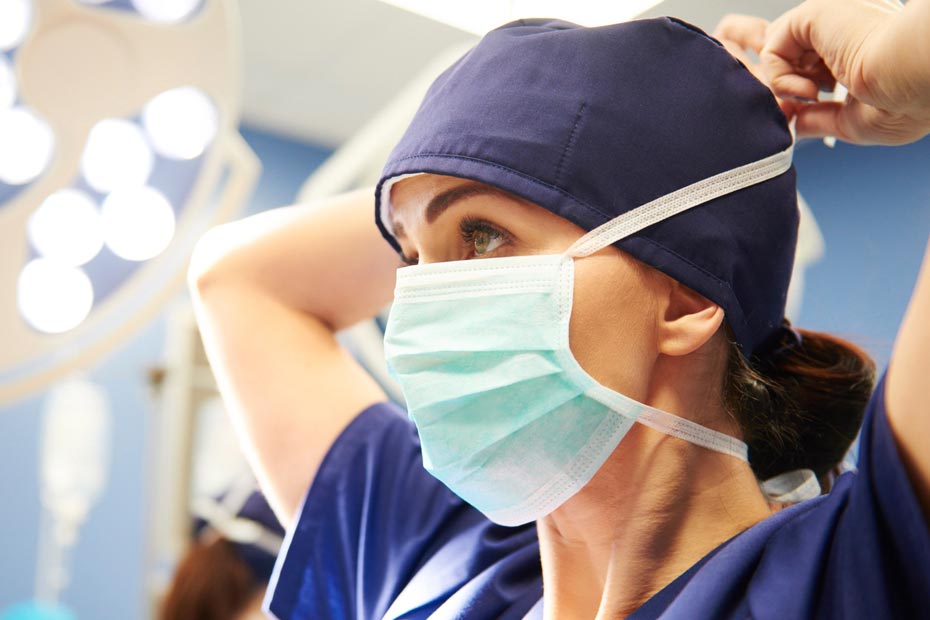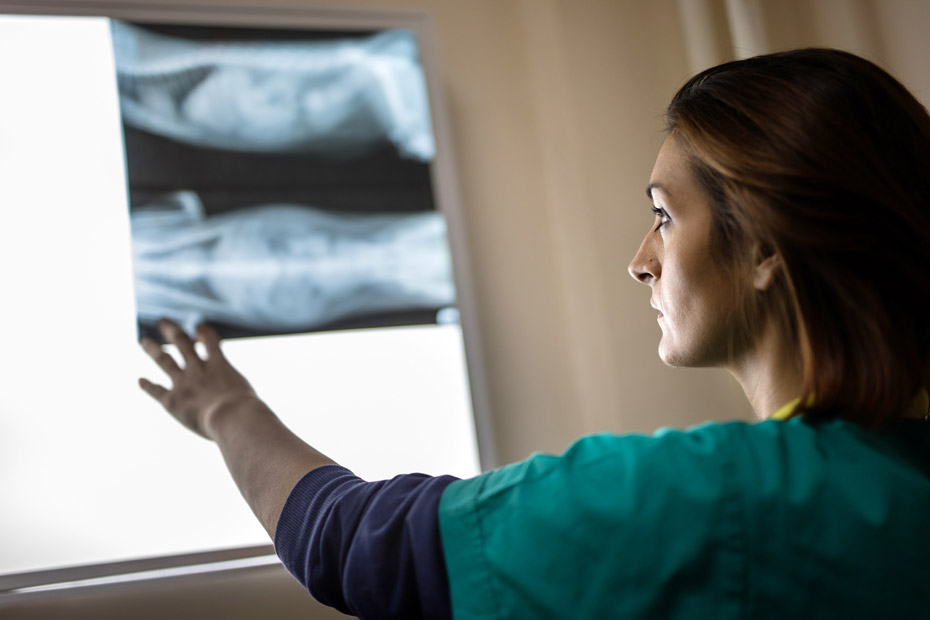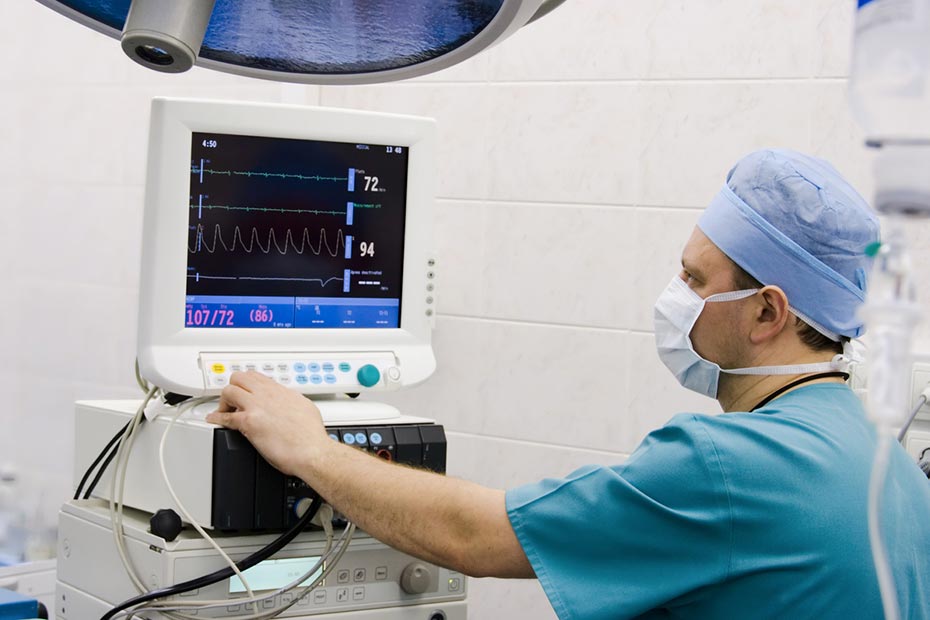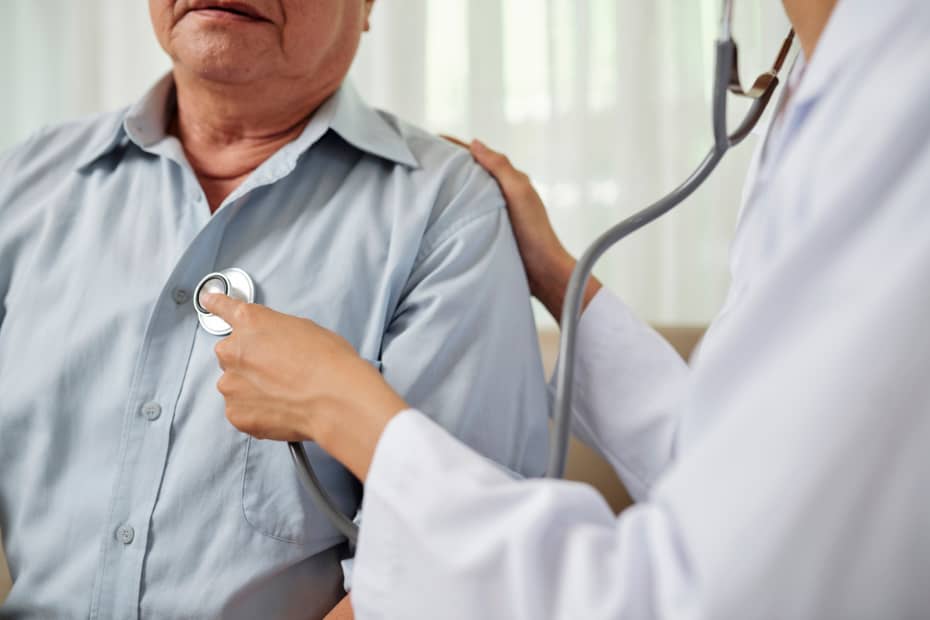It’s never been more important to fund medical research. Yet as medical and scientific heroes work on the front line and behind the scenes to tackle the world’s health challenges, some of their most innovative ideas don’t see the light of day. This is where Angels Den comes in.
“The Angels Den formula is unconventional. It was created to cut through the red tape and fund ideas that traditional routes might not be ready for,” said Dr. Tim Rutledge, President and CEO, St. Michael’s Hospital, Unity Health Toronto.
A Launchpad for Transformative Healthcare
This year, six teams of all-star doctors and scientists battled it out on Angels Den 2020. The teams had four minutes to pitch their ideas in front of a panel of celebrity judges: retail, fashion and business pioneer Joe Mimran, engineer and serial entrepreneur Michele Romanow, and producer and content creator Vinay Vermin — as well as fifty esteemed jurors and the Canadian public. Their task was to demonstrate why their projects deserve funding. On the line was nearly $500,000 in prize money.
The teams were divided into two research streams, competing for two $150,000 awards: the Keenan COVID-19 Research Award focused on ideas related to COVID-19 management and solutions, and the Odette Innovative Health Award focused on innovative solutions for other life-changing healthcare issues. There was also the People’s Choice Award, which was voted on by the general public and came with a $50,000 prize. Each finalist also received $25,000.
And the Winners Are …
Lung Life After COVID-19
Nephrologist Dr. Darren Yuen and Respirologist Dr. Kieran McIntyre were awarded the Keenan COVID-19 Research Award for their “Lung Life After COVID-19” project.
Doctors are seeing first-hand how COVID-19 can damage the lungs and cause potentially irreversible scarring. “It’s hard to breathe when your lungs are full of scarring,” explained Dr. McIntyre in the pitch, adding that studies show about 40% of those diagnosed with COVID-19 may develop long-term breathing problems even after recovering from the virus.
Joining forces to form the COVID Lung Clinic, Dr. McIntyre and Dr. Yuen aim to solve two problems: first, to identify lung damage quickly in one visit, and second to develop an anti-scarring treatment. Their solution is to use a new bedside ultrasound tool to diagnose lung scarring rapidly, and at the same time test a new drug to treat COVID-19 induced lung damage.
Winning the award means the doctors now have the funding to purchase more ultra sound devices to provide real-time screening, and complete the pre-clinical testing to get ready for the first-in-the-world clinical trial for the new drug.
SkIP TECH for Pressure Wounds Prevention
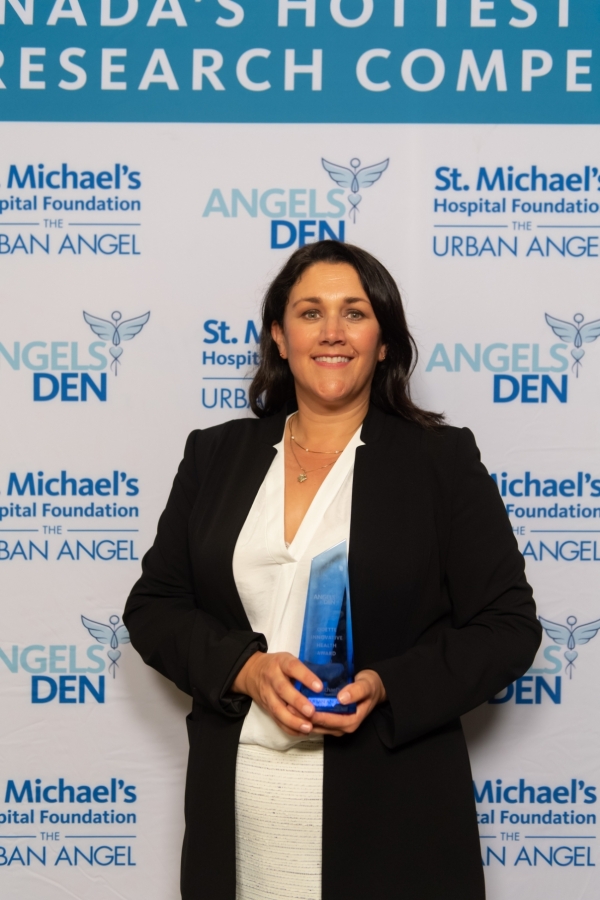
Plastic, Reconstructive and Aesthetic Surgeon Dr. Karen Cross won the Odette Innovative Health Award for her work in tackling the uniquely Canadian epidemic of pressure injuries (also known as bed sores). These erosions through flesh, muscle and bone can lead to infection, sepsis and death. Dr. Cross calls them ‘never events.’ “They are never supposed to happen,” she says. “These injuries are completely preventable.”
However, among the developed countries, Canada is the number one country in terms of volume of patients with these injuries, and spends $5.9 billion each year to treat the problem. All Dr. Cross has had to care for her patients is her eyes and a paper ruler she’s been given. “As an expert in the space, this is all I have to treat my patients. How can I see 10 million people with my own eyes and just a paper ruler? It is just impossible.”
Her solution, SkIP (Skin Imaging for Pressure Injuries) technology will enable non-specialist healthcare practitioners to monitor patients at risk of developing pressure injuries.
The technology includes a proprietary camera and LED ring that can look below the skin for novel bio markers predictive of tissue health. The tool interfaces with a smart phone and an app (it’s as simple as taking a photo), and in 750 milliseconds it can determine the risk level of the patient and provide treatment recommendations. This will enable non-experts to do assessments and know what to do in terms of next steps.
With the award funding, Dr. Cross and her team can put the devices into trial this year and begin manufacturing and commercialization to help revent needless suffering.
The People’s Choice Award went to Smart Garments by Dr. Jane Batt. This smart textile garments can provide patients AI neuromuscular electrical stimulation therapy to prevent muscle waste.
Watch Angels Den 2020 to see these brightest minds at St. Michael’s Hospital pitch their groundbreaking ideas, and hear all the stories behind the brilliant finalists and winners of this year’s competition.
This article is intended as general information only and is not to be relied upon as constituting legal, financial or other professional advice. A professional advisor should be consulted regarding your specific situation. Information presented is believed to be factual and up-to-date but we do not guarantee its accuracy and it should not be regarded as a complete analysis of the subjects discussed. All expressions of opinion reflect the judgment of the authors as of the date of publication and are subject to change. No endorsement of any third parties or their advice, opinions, information, products or services is expressly given or implied by Royal Bank of Canada or any of its affiliates.








